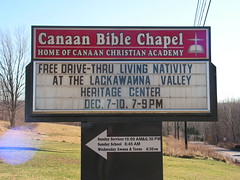Drive-thru Living Nativity?
Originally uploaded by greedyreader

In car nation?

Impressive, if none too good for the environment. (HT Tony Jones)
A note about the creator of this short music video: Filmmaker Mark Johnson traveled around the globe getting street musicians and others to record part of the track for Stand By Me. Using battery powered equipment and a pocket full of Frequent Flyer miles he got tracks from dozens of performers. Each one was able to wear headphones and hear what the other performers had done.
 Friday was my annual pre-Christmas chin wag, food eat and wine drink with my friend Rob.
Friday was my annual pre-Christmas chin wag, food eat and wine drink with my friend Rob. Read two books on preaching last week. One was a big disappointment the other a pleasant surprise.
Read two books on preaching last week. One was a big disappointment the other a pleasant surprise. Anabaptist Preaching was deeply disapointng. I had been hoping that it would live up to the subtitle, a conversation between pulpit, pew and bible. No such luck. Only one chapter in this symposium was on the money in this regard and that itself is non too substantial. As for the other chapters far too many were rather light weight and very few had anything remotely distinctive to offer. I had imagined that such a book would introduce me to a tradition less wedded to the traditional monologue but I reckon I'm going to have to look elsewhere.
Anabaptist Preaching was deeply disapointng. I had been hoping that it would live up to the subtitle, a conversation between pulpit, pew and bible. No such luck. Only one chapter in this symposium was on the money in this regard and that itself is non too substantial. As for the other chapters far too many were rather light weight and very few had anything remotely distinctive to offer. I had imagined that such a book would introduce me to a tradition less wedded to the traditional monologue but I reckon I'm going to have to look elsewhere.
 A while ago I posted on the delights of podcasts. Just in case anyone else out there is as sad as
A while ago I posted on the delights of podcasts. Just in case anyone else out there is as sad as Bit of a heavy day teaching yesterday. The morning and afternoon were spent with undergraduates on our
Bit of a heavy day teaching yesterday. The morning and afternoon were spent with undergraduates on our